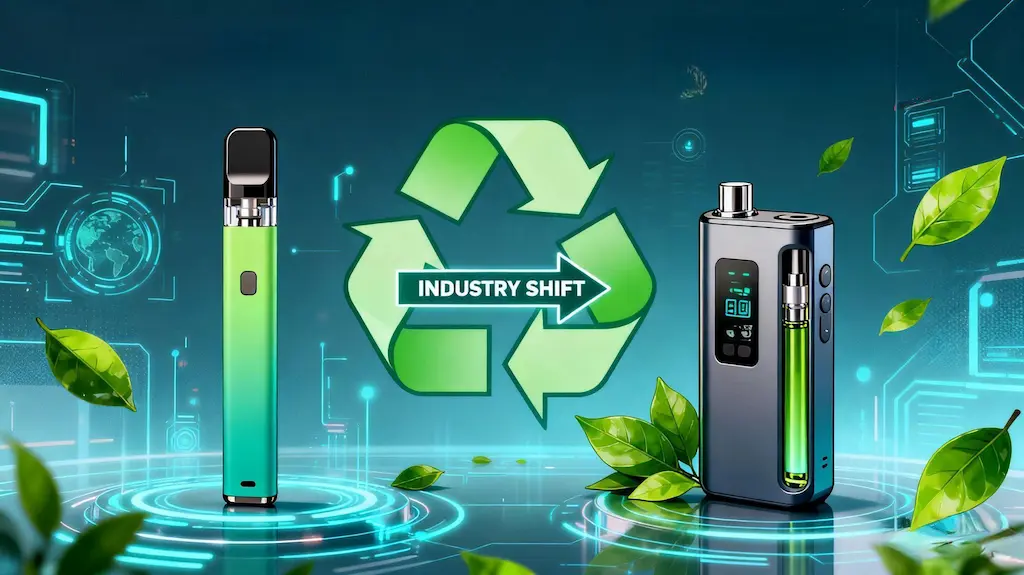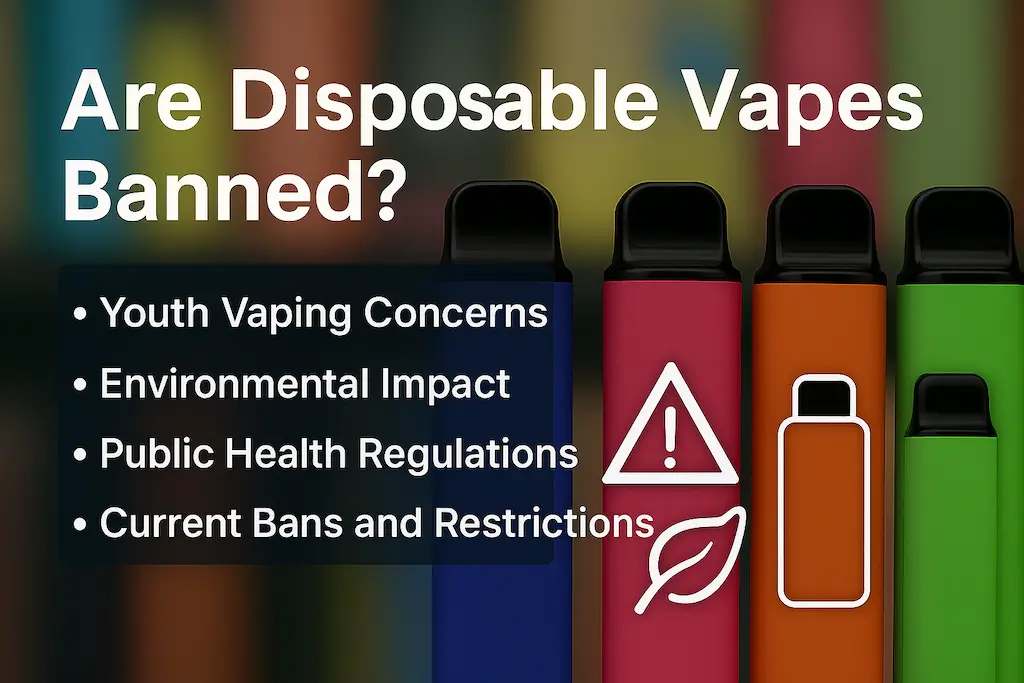Les produits de vapotage jetables sont devenus incroyablement populaires parmi les vapoteurs nouveaux et expérimentés en raison de leur commodité et de leur prix abordable. Toutefois, en raison des préoccupations croissantes concernant le vapotage chez les jeunes, la santé publique et les déchets environnementaux, de nombreux pays ont commencé à imposer des restrictions, voire des interdictions totales, sur les produits de vapotage jetables.
Mais les vapes jetables sont-elles vraiment interdites partout ? Explorons la situation mondiale actuelle et comprenons ce qui change dans le monde du vapotage.
Pourquoi les vapes jetables sont-elles interdites dans certains endroits ?
1. Préoccupations concernant Le vapotage chez les jeunes
L'une des principales raisons pour lesquelles les vapes jetables font l'objet d'une interdiction est l'augmentation du nombre de jeunes qui fument. Leur design coloré, leurs saveurs sucrées et leur facilité d'accès ont attiré les jeunes utilisateurs, ce qui a incité les gouvernements à adopter des mesures plus strictes. des règlements. De nombreuses organisations de santé publique affirment que les vapes jetables encouragent la dépendance à la nicotine chez les adolescents et devraient être limitées pour prévenir les risques sanitaires à long terme.
2. Impact sur l'environnement
Les vapes jetables contribuent de manière significative aux déchets électroniques. Chaque appareil contient une batterie au lithium intégrée qui ne peut pas être réutilisée ou facilement recyclée. Lorsqu'ils sont jetés de manière inappropriée, ces appareils laissent échapper des matériaux nocifs dans l'environnement. Les pays qui cherchent à réduire les déchets de plastique et de piles à usage unique ciblent donc les vapes jetables dans le cadre de réformes environnementales plus larges.

3. Règlements en matière de santé publique et de sécurité
Les gouvernements renforcent également les règles visant à garantir la sécurité et la qualité des produits. Il s'est avéré que certaines vapes jetables dépassaient les limites légales de nicotine ou contenaient des ingrédients non réglementés. Pour protéger les consommateurs, plusieurs agences sanitaires ont décidé de restreindre ou d'interdire leur vente jusqu'à ce que les normes de qualité appropriées soient respectées.
Où les vapes jetables sont-elles actuellement interdites ?
1. Pays avec des interdictions totales ou partielles
- Royaume-Uni (UK) : Le gouvernement britannique a annoncé son intention d'interdire les vapes jetables d'ici 2025 dans le cadre de sa campagne antitabac.
- Australie : Les vapes jetables font l'objet de restrictions importantes ; leur importation et leur vente ne sont autorisées que sur ordonnance.
- États-Unis (US) : Bien qu'ils ne soient pas interdits à l'échelle nationale, certains États comme la Californie et New York ont mis en place des interdictions d'arômes ou des restrictions de vente.
- Union européenne (UE) : L'UE applique des réglementations strictes en matière de nicotine et d'emballage, et plusieurs États membres envisagent de les interdire purement et simplement.
2. Régions avec législation en cours
Des pays comme le Canada et la Nouvelle-Zélande débattent actuellement d'une législation visant à réglementer la vente de vapes jetables. La tendance mondiale suggère que de plus en plus de régions adopteront des politiques plus strictes dans les années à venir, en se concentrant principalement sur la protection de la jeunesse et la durabilité.
Peut-on encore acheter légalement des vapes jetables ?
1. Pays autorisant les ventes réglementées
Oui, les vapes jetables sont encore légales dans de nombreux pays. Aux États-Unis, au Canada et dans certaines parties de l'Europe, les consommateurs peuvent acheter des vapes jetables à condition qu'elles répondent aux normes de sécurité et d'étiquetage du pays. La plupart des gouvernements réglementent la teneur en nicotine, les types d'arômes et les méthodes publicitaires, plutôt que d'interdire complètement tous les produits.
2. Le vapotage est-il légal ou illégal ?
Pour rester légales, les vapes jetables doivent :
- Contenir des taux de nicotine dans les limites approuvées (généralement ≤20 mg/ml dans l'UE).
- Affichage LED la santé les avertissements et les listes d'ingrédients.
- Respecter les réglementations locales en matière d'importation et de fiscalité.
- n'être vendus qu'à des personnes ayant l'âge légal de fumer.
Les consommateurs devraient toujours acheter auprès de détaillants réputés ou de fabricants certifiés afin d'éviter les produits non approuvés ou contrefaits.
Quelle est la prochaine étape pour l'industrie du vapotage à usage unique ?
1. Vers des dispositifs rechargeables et réutilisables
Face aux pressions environnementales et juridiques croissantes, l'industrie du vapotage s'oriente vers des solutions plus durables. Les vapes rechargeables ou rechargeables réduisent les déchets et offrent aux utilisateurs une option plus durable et plus rentable tout en respectant les objectifs écologiques.
2. Collaboration entre les gouvernements et les fabricants
Les fabricants commencent à coopérer avec les autorités de réglementation pour améliorer la traçabilité des produits et les efforts de recyclage. Les tendances futures incluront probablement des matériaux biodégradables pour la vape, des programmes de collecte de batteries et des normes de fabrication plus strictes.

Conclusion : Pas d'interdiction mondiale, mais un changement mondial
Les vapes jetables ne sont pas interdites dans le monde entier, mais elles font l'objet d'une attention croissante. Alors que certains pays appliquent des interdictions pour protéger les jeunes et l'environnement, d'autres se concentrent sur une réglementation plus stricte et sur la durabilité. Le secteur du vapotage évolue rapidement, passant de la commodité de l'usage unique à l'innovation responsable. En tant que consommateur, il est important de rester informé sur lois locales sur la vape et en achetant uniquement réglementé vapes jetables garantira à la fois la sécurité et le respect de la législation.
